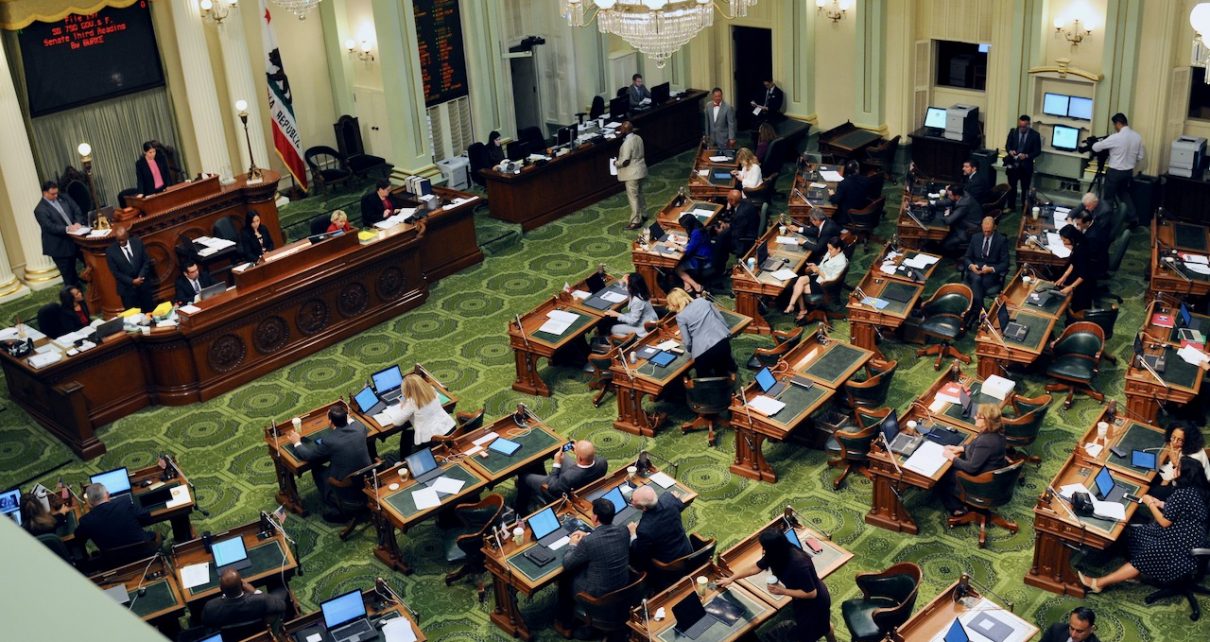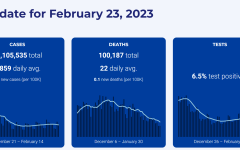
California State Assembly Chamber. (Photo: Kevin Sanders for California Globe)
A Look Back at the California Legislature on March 16, 2020 during the COVID-19 Pandemic
Unique Rule Suspensions
By Chris Micheli, September 8, 2023 3:54 pm
You may recall Monday, March 16, 2020. It was the day the Legislature passed legislation to deal with the COVID-19 pandemic, and then recessed for six weeks before returning to Sacramento. I wanted to revisit the day to note the unique procedural actions that took place that day. My summary of what happened that day procedurally is based upon the Assembly Floor actions.
First, there was a motion to suspend the rules for the purpose of withdrawing Senate Bills Nos. 89 and 117 from the Committee on Budget, and be placed on the Daily File, for the purpose of consideration, without reference to print or file. This motion to suspend the Rules was carried by unanimous consent. So, the first rule suspended was to withdraw these two bills from committee and place on the Floor for consideration.
Second, the Assembly adopted a “Resolution to Dispense with Constitutional Provision.” That resolution provided that, “Senate Bills Nos. 89 and 117 present a case of urgency, as that term is used in Article IV, Section 8(b)(1) of the Constitution, and the provision of that section requiring that the bill be read on three separate days in each house is hereby dispensed with, and it is ordered that the bills be placed upon their passage, and considered engrossed.”
The California Constitution requires a bill to be read on three separate days. However, this constitutional requirement can be waived with a ¾ vote of the house. So, the second rule that was suspended was to dispense with the required three readings of a bill.
Third, Governor Gavin Newsom provided a letter that was printed in the Daily Journal explaining the justification to waive the 72-hour in print rule. The Governor wrote:
Governor’s Office, Sacramento March 16, 2020
To the Members of the California State Senate and the California State Assembly:
Our state, our nation, and our world are facing a challenge unprecedented in modern times. The COVID-19 pandemic compels us all to find new ways of coming together, even as we must also seek out new ways of staying apart. Recognizing the magnitude of this moment, on March 4, 2020, I proclaimed a state of emergency in California. In so doing, I found that the conditions set forth in Government Code, section 8558(b), had been met. Moreover, I hereby find that the declared state of emergency constitutes a state of emergency within the meaning of Article XIII B, section 3, subdivision (c), paragraph (2) of the California Constitution. The California Constitution generally provides—in Article IV, section 8, subdivision (b), paragraph (2)—that “no bill may be passed or ultimately become a statute” unless it has been “printed, distributed to the members, and published on the Internet, in its final form, for at least 72 hours before the vote.” The Constitution further provides, however, that this 72-hour notice period “may be waived” if the Governor submits to the Legislature “a written statement that dispensing with this notice period for that bill is necessary to address a state of emergency… that has been declared by the Governor” within the meaning of Article XIII B, section 3, subdivision (c), paragraph (2). Today I write to you to state the obvious: we must rise to the challenge facing our state with every tool at our disposal and without a second of delay. We cannot hesitate to meet this moment
Accordingly, I submit to you this written statement that, to address the state of emergency I have declared, it is necessary to dispense with the 72-hour notice period set forth in Article IV, section 8, subdivision (b), paragraph (2) of the California Constitution, as to the following legislation: AB 89 AB 117 SB 89 SB 117 In addition to addressing the state of emergency I proclaimed in connection with COVID-19 on March 4, 2020, this legislation also addresses the 2018 Camp Fire, for which a state of emergency was proclaimed on November 8, 2018. I look forward to working with you in the weeks, days and hours ahead as we conduct the urgent business of our state. Sincerely, GAVIN NEWSOM
Fourth, as a result of the Governor’s statement, a second “Resolution to Dispense with Constitutional Provision. That resolution provided that, “Senate Bills Nos. 89 and 117 present a case of urgency, as that term is used in Article IV, Section 8(b)(2) of the Constitution, and the provisions of that section requiring that bills with any amendments have been printed, distributed to members, and published on the Internet, in their final form, for at least 72 hours before the vote is hereby dispensed with, and it is ordered that the bills be considered for passage.”
The California Constitution requires a bill to be in its final form for at least 72 hours prior to adoption by the Senate and Assembly. However, this constitutional requirement can be waived with a 2/3 vote of the houses following a gubernatorial proclamation. So, the third rule that was suspended was to dispense with the required 72-hours in print rule for a bill.
Finally, these two Senate Bills were permitted to be taken up in their amended form without reference to print or file and considered, debated, and voted upon. After passage on the Assembly Floor, the Assembly granted unanimous consent that Senate Bill Nos. 89 and 117 be ordered transmitted to the Senate immediately. Thereafter, the Senate took final action on these measures.
March 16, 2020 was obviously a unique day in California history, and the procedural hurdles that were overcome that afternoon present a unique case of study regarding how the Legislature reacted to a worldwide pandemic and how its procedural rules played an important role in the legislative response to COVID.
- Service of Summons in California Civil Actions - December 11, 2024
- Sunset Clause Versus Repeal Clause - December 10, 2024
- Describing a Spot Bill - December 9, 2024





Thanks Chris, for always giving great information on the workings of our state government, it’s almost always too “nerdy” for a dullard like me but you make me work to understand it. Unfortunately, the Googlemachine is often uncooperative in my searches, but don’t give up on me!
That was a nightmarish time when Democrats abused their power acting like petty authoritarian, totalitarian dictators. Hopefully, enough California voters have awakened to their tyranny and will do everything they can drive them from office?